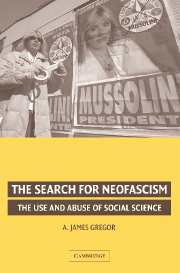Book contents
- Frontmatter
- Contents
- Preface
- Acknowledgments
- 1 The Decay of an Enterprise
- 2 Fascism
- 3 Neofascism: Some Presumptive Candidates
- 4 Julius Evola, Fascism, and Neofascism
- 5 Black Nationalism and Neofascism: Marcus Garvey and the Universal Negro Improvement Association
- 6 Black Nationalism and Neofascism: Elijah Muhammad and the Lost-Found Nation of Islam
- 7 Islamofascism: Neofascism in the Middle East
- 8 Hindutva: The Case for a Saffron Fascism
- 9 Post-Maoist China: Fascism with Chinese Characteristics
- 10 Conclusions
- Index
7 - Islamofascism: Neofascism in the Middle East
Published online by Cambridge University Press: 05 June 2012
- Frontmatter
- Contents
- Preface
- Acknowledgments
- 1 The Decay of an Enterprise
- 2 Fascism
- 3 Neofascism: Some Presumptive Candidates
- 4 Julius Evola, Fascism, and Neofascism
- 5 Black Nationalism and Neofascism: Marcus Garvey and the Universal Negro Improvement Association
- 6 Black Nationalism and Neofascism: Elijah Muhammad and the Lost-Found Nation of Islam
- 7 Islamofascism: Neofascism in the Middle East
- 8 Hindutva: The Case for a Saffron Fascism
- 9 Post-Maoist China: Fascism with Chinese Characteristics
- 10 Conclusions
- Index
Summary
The search for neofascism in the Middle East reveals a great deal about the general character of the search itself, as well as its putative content. It makes evident the prevailing notions that shape the inquiry, making clear the uncertainty of many of its underlying premises. The consequence is reflected in the tortured results one finds in the contemporary analyses devoted to what has come to be known as “Middle Eastern fascism,” and its more recent incarnation, “Islamofascism.”
There is a loosely structured argument that identifies some of the secular Arab regimes in the region as “fascist-style dictatorships,” and contemporary radical Islamist groups as somehow representing its “religious variant.” Some have suggested that historic Fascism was intrinsically “fundamentalist” and, as a consequence, shared some of the most negative properties of the religious fanaticism of contemporary Islamism.
The identification of Middle Eastern political movements as neofascist did not simply arise as a consequence of the terrorist attack on the World Trade Towers on 11 September 2001. Academicians early employed the notion in their efforts to understand something of the first independent political responses made by those “decolonized” peoples in Africa, Asia, and the Middle East following the end of the Second World War. Amid those responses, certain political features appeared with some impressive regularity.
Immediately following the decolonization of those sectors of the less-developed world that had previously been subject to the control of nations more industrially advanced, one witnessed the advent of industrializing and modernizing movements led by self-proclaimed revolutionary “anti-imperialist vanguards.
- Type
- Chapter
- Information
- The Search for NeofascismThe Use and Abuse of Social Science, pp. 166 - 196Publisher: Cambridge University PressPrint publication year: 2006



